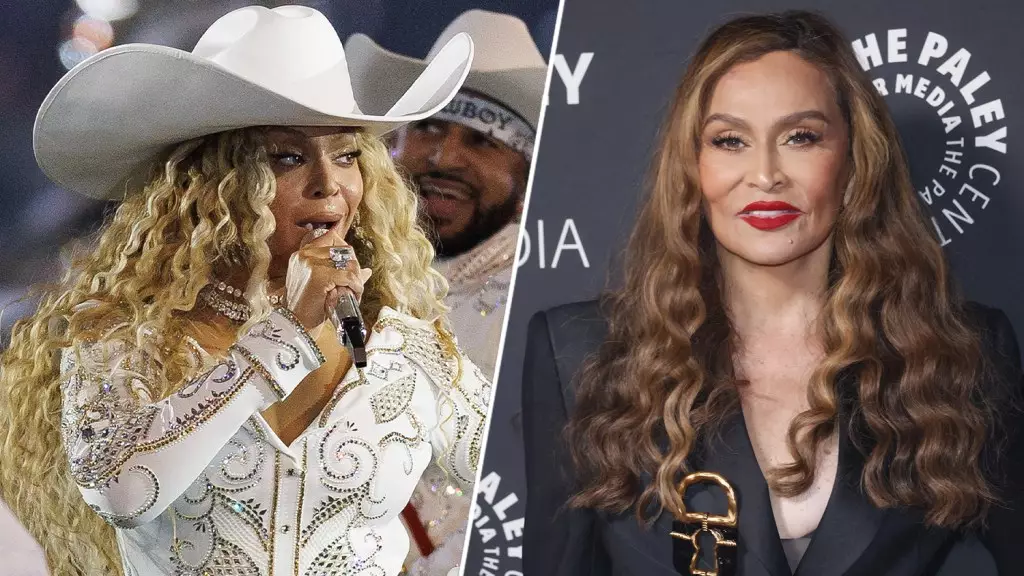In the world of entertainment, few figures elicit both admiration and ire like Beyoncé. With her powerful voice and remarkable stage presence, she’s amassed a dedicated fanbase and numerous accolades. However, as with any star, criticism often lurks in the shadows. Recently, during a performance at the Houston Texans-Baltimore Ravens game—broadcasted live on Netflix—Beyoncé was met with both applause and disdain. Yet, it wasn’t Beyoncé herself responding to the negative chatter, but rather her mother, Tina Knowles, who took to social media to provide a fierce defense of her daughter.
Tina Knowles’ response to online negativity illustrates a maternal instinct to protect one’s child, even amidst public scrutiny. She reposted a fan’s sentiments, remarking on the peculiar nature of individuals who choose to invest their time in critiquing someone they profess to dislike. Knowles pointedly highlighted the irony that such critics often appear obsessed with the very talent they denounce. This candid reflection sheds light on a broader societal issue: the tendency to focus on negativity, accompanied by a dismissal of the hard work and artistry behind celebrity performances.
Beyoncé’s halftime show stood out not only for its entertainment value but also for its historic significance. The performance featured songs from her debut country album, “Cowboy Carter,” marking a notable shift in her musical repertoire. This pivot into country music underscores her versatility as an artist, extending her influence beyond the R&B genre that originally catapulted her to fame. With over 27 million viewers tuning in, the show became a major cultural event, proving that Beyoncé’s reach remains expansive and that she can captivate a diverse audience.
The halftime performance was not only a showcase of Beyoncé’s vocal prowess but also a family affair, featuring her daughter, Blue Ivy Carter, and collaborations with artists like Shaboozey and Post Malone. Such moments of familial connection on a grand stage not only resonate with audiences but also contribute to a narrative of legacy and continuity in the music industry. The decision to title the standalone special “Beyoncé Bowl” further cements this moment in cultural history, linking her artistry to a prominent national celebration.
It’s impossible to overlook the controversy that often accompanies high-profile figures in the entertainment industry. Beyoncé’s recent performance took place against the backdrop of serious allegations against her husband, Jay-Z, which were highlighted by NFL Commissioner Roger Goodell. Despite these allegations, the NFL’s commitment to their partnership with Jay-Z’s Roc Nation indicates a complex balance between personal lives and professional endeavors within the entertainment sphere.
The public’s reaction to Beyoncé and her family’s involvement in such matters raises crucial questions about the intersection of celebrity and accountability. While some might view her performance through the lens of Jay-Z’s controversies, others celebrate it as an independent artistic expression. This disparity reflects the broader tension between public perception and personal realities, wherein the legacy of an artist can be entangled with the actions of those close to them.
Ultimately, Beyoncé’s journey and the response from her mother highlight an essential narrative of resilience. In an era where public figures are all too often subjected to invasive scrutiny, the solidarity shown by Tina Knowles serves as a powerful reminder of familial support amidst adversity. The lessons drawn from their experiences encourage fans and critics alike to reflect on the nature of obsession and admiration.
Tina Knowles’ closing remarks draw on a message of empowerment: when faced with negativity, one must channel energy into hard work and perseverance. This perspective is especially salient in an industry dominated by fleeting trends and public opinion. By rallying around figures like Beyoncé, who personify strength in the face of adversity, fans are encouraged to embrace a more supportive and positive discourse surrounding talent and artistry.
The dynamics of celebrity, critique, and familial support interface intricately within the public consciousness, providing rich ground for discussion on resilience, artistry, and the consumption of fame.
